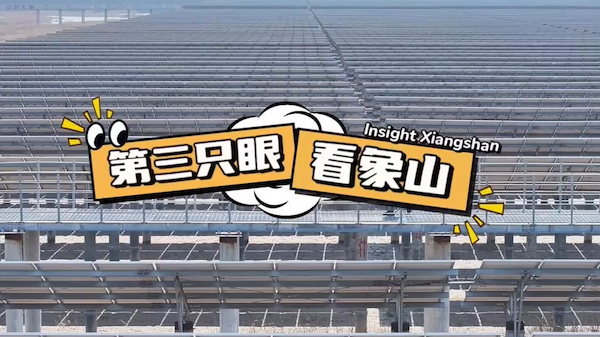Measures to boost industrial system

Shi Yu/China Daily
Effort adheres to China's 'new quality productive forces' philosophy
The State Council, China's Cabinet, has rolled out a host of measures to enhance the resilience and competitiveness of industrial and supply chains and build up the nation's digital economy, as part of broader steps to bolster the development of "new quality productive forces".
The Government Work Report, approved by legislators at the second session of the 14th National People's Congress on Monday, outlined steps to modernize the nation's industrial system, including stronger measures that will harness the role of innovation and promote new industrialization.
The nation will launch an initiative for pursuing high-quality development of key manufacturing chains, with a focus on shoring up weak links, reinforcing strengths and fostering new capabilities, the report said.
Officials and experts said the slew of measures will provide a solid policy framework for the nation's industrial upgrades and serve as a strong pillar for the development of new quality productive forces, which feature high technology, high efficiency and high quality, and are aligned with the country's new development philosophy.
Jin Zhuanglong, minister of industry and information technology, said on the sidelines of the annual legislative sessions last week that the nation must accelerate the construction of a modern industrial system with advanced manufacturing as its backbone.
He highlighted the need to promote the upgrade of China's traditional sectors to enable their green, intelligent and high-end transformation, saying that the government will continue to facilitate the development of a number of Chinese manufacturing brands with international influence.
According to the report, the nation will launch industrial innovation projects, improve the industrial ecosystem, expand the application of innovations, and promote the integrated and clustered development of strategic emerging industries.
More work will be done to consolidate and enhance the nation's leading position in industries such as intelligent connected new energy vehicles; step up development of hydrogen power, new materials, innovative drugs and other cutting-edge sectors; and foster new growth engines in fields such as biomanufacturing, commercial spaceflight and the low-altitude economy.
New development plans will be made for the industries of the future, the report said, adding that the nation will strive to open up new fields such as quantum technology and life sciences, and create a number of zones for pioneering the development of future-oriented industries.
According to the Ministry of Industry and Information Technology, the scale of China's manufacturing sector accounted for over 30 percent of the global total in 2023, with the nation's total industrial added value reaching 39.9 trillion yuan ($5.5 trillion).
Zhu Keli, founding director of the China Institute of New Economy, said ensuring that the nation's industrial system is independent and under its own control was emphasized in the latest report.
He highlighted the significance of the national initiative to boost the high-quality development of China's key industrial chains in the manufacturing sector, saying that such a move would strengthen the competitiveness and resilience of the chains.
Li Yan, deputy head of the department responsible for researching the industrial economy with the Development Research Center of the State Council, said that the rising cost of production and the lack of investment in research and development remained the major challenges facing China's manufacturing businesses.
As an example, she said that the R&D intensity - the ratio of R&D to GDP - of the nation's large and medium-sized manufacturing enterprises only stood at about 1.4 percent in 2022, compared with the national average of 2.56 percent for that year.
"With its low profitability and wage levels, the manufacturing sector isn't appealing for high-tech talent," she explained.
Jin, the minister, said the government will seek to further amplify the role of leading firms in industrial chains to strengthen the manufacturing sector.
Meanwhile, the Government Work Report said the nation will encourage the development of venture capital and equity investment and improve the functions of industrial investment funds.
Another focus of the report is to extend stronger support to the high-quality development of the digital economy, including efforts to transform traditional industries with digital technologies and further integrate digital technology into the real economy.
The Government Work Report said the nation will step up R&D and the application of big data and AI, launch an AI Plus initiative and build digital industry clusters with international competitiveness.
China will work to digitalize the manufacturing sector and fast-track the large-scale application of the industrial internet, the report said, adding that more work will be done to promote the digitalization of the service sector and to build smart cities and digital villages. An initiative will be launched to also promote the digitalization of small and medium-sized enterprises.
The draft budget report released by the Ministry of Finance last week said the central government will allocate 370.8 billion yuan for science and technology expenditures, up 10 percent year-on-year, with a focus on basic research, applied basic research, and national strategic science and technology tasks.
Zhu, from the China Institute of New Economy, said the measures rolled out in the report were both forward-looking and systematic.
"Enhancing the applications of R&D outcomes and building digital industry clusters will help build up the competitiveness of the nation's digital economy and provide a solid foundation for its long-term growth," he said.
He also highlighted the significance of developing future-oriented digital infrastructure, explaining that a strong computation system serves as the pillar for the development of AI.
"The cultivation of emerging and future industries can help the nation take the high ground in technology and industry, avoiding falling behind in the new round of technological revolution and industrial transformation," he said.
Furthermore, the growth of the digital economy can drive the digital transformation of the economy, enhancing the quality and efficiency of growth while providing the public with more convenient, efficient and intelligent digital services, he said.
Yu Xiaohui, a national political adviser and president of the China Academy of Information and Communications, said in an interview with Xinhua News Agency that he expects AI technology and its related sectors to enter a key period of rapid evolution and breakthroughs.
He said the launching of an AI Plus initiative will promote the systematic empowerment of key areas by artificial intelligence, accelerate the reshaping of industrial ecology and foster new economic development momentum.
A report conducted by Yu's academy last year showed that the scale of China's core AI industry output reached 578.7 billion yuan, with 4,482 related enterprises. The AI industry chain has covered key upstream and downstream fields such as chips, algorithms, data, platforms and applications.

 China welcomes global travelers with open arms
China welcomes global travelers with open arms  Badminton excitement builds in Ningbo city
Badminton excitement builds in Ningbo city  A green revolution in Ningbo's tidal flats
A green revolution in Ningbo's tidal flats 


